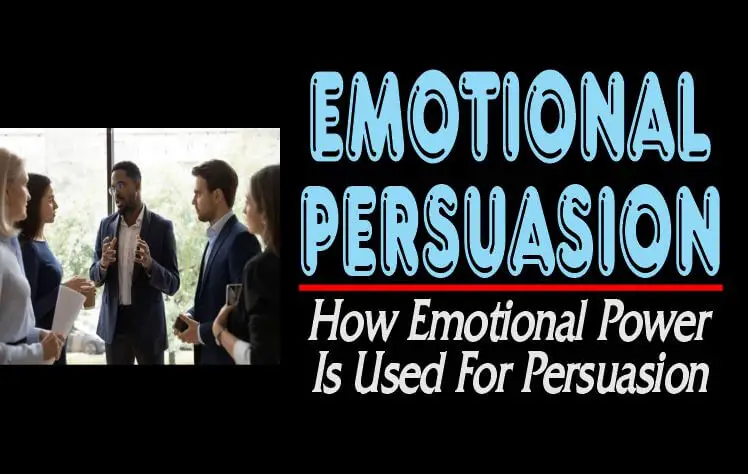Discover and unlock the secret of emotional persuasion and how to effectively influence others through the power of emotions and effective communication.
Emotional power has been a powerful tool in emotional persuasion for centuries and is still as effective today.
Whether it’s in marketing, politics, or everyday interactions, the ability to evoke powerful emotions can greatly influence people’s decisions and behaviors.
The use of emotional persuasion to get people to behave in specific ways often involves appealing to individuals’ values, beliefs, and desires through emotional appeals like humor, fear, love, or anger.
By connecting with people on an emotional level, persuaders can create a sense of identity between themselves and their audience.
This connection can create trust and empathetic understanding.
However, this tactic can also be dangerous if used manipulatively, such as targeting vulnerable individuals or using propaganda to push political or social agendas.
Understanding how emotional power is used for persuasion can help individuals become more aware of the techniques being used on them and make better-informed decisions.
What is Emotional Persuasion?

Emotional persuasion is the act of influencing someone’s thoughts, choices, or actions by appealing to their feelings rather than logic alone.
It works by triggering emotions like trust, fear, hope, or empathy to create a deeper connection with the message.
Instead of presenting only facts, emotional persuasion makes the message feel personal and meaningful, guiding the listener or reader toward a response that feels emotionally right.
It’s often used in storytelling, marketing, and everyday conversations to move people to act.
Understanding the dynamics of emotions and the role they play in our decisions, behaviours, and experiences can hand one emotional power with which to navigate society.
When you know how people will behave when they are under the influence of a certain emotion, you can always use that knowledge as a tool to sway and get people to do your bidding.

The Science Behind Emotional Power and Persuasion
Emotional power and persuasion are based on the neurological processes that occur in the brain when we experience certain emotions.
When we feel powerful emotions such as happiness, anger, fear, or sadness, our brain releases neurotransmitters such as dopamine, serotonin, oxytocin, or cortisol that affect our behavior and decision-making.
These emotions help us to frame our perception of the world and shape the values, beliefs, and attitudes we hold.
As a result, emotions play a crucial role in the way we process information and make decisions, and that’s how emotional power is used for persuasion.
For example, positive emotions like joy or excitement can be used to create a sense of enthusiasm and excitement around an idea or product, making people more willing to engage with it.
Moreover, emotions like fear or anxiety can create a sense of urgency and need for change, motivating people to take action.
In addition to this, emotions can also be used to appeal to people’s values and beliefs, creating a sense of empathy and connection between the message and the audience.
This connection can even override people’s rational judgment and lead to more profound changes in attitudes and behavior.
The science behind emotional power and persuasion lies in our brain’s ability to process and respond to emotional stimuli, shaping our values, beliefs, and behaviors.
By tapping into people’s emotions and creating a sense of connection and urgency, we can persuade and influence them more effectively.
Related Posts
- 10 Powerful Emotions Used in Persuasion
- How Emotions Shape Thoughts and Behaviours
- Understanding Emotional Intelligence
- 15 Phrases That Make You Emotionally Intelligent
- History Of Emotional Intelligence, And Frequently Asked Questions
- The Importance Of Self-Awareness And Its Improvement
- How Emotional Intelligence and the Brain Relates
Importance of Emotional Power in Persuasion

Emotional persuasion is important because it taps into the feelings and motivations of people, allowing persuasive messages to sink in and resonate on a deeper level.
While logic and rationality certainly have their place in persuasion, emotions often have a stronger impact on decision-making and behavior.
Here are some key reasons why emotional power is important in persuasion:
Human Nature
Emotions are deeply woven into how people think, act, and decide.
You don’t just process facts, you react based on how things make you feel. That’s why emotional persuasion works.
It speaks directly to the heart, triggering instinctive reactions and helping your message resonate.
By appealing to someone’s feelings, you create a stronger connection, one that goes beyond logic and leads to decisions that feel personally meaningful and aligned with their inner world.
Attention and Memory
Emotional messages catch your attention faster than plain facts.
When something hits you emotionally, it sticks. You’re more likely to remember stories or moments that made you laugh, cry, or feel inspired than a list of statistics.
That’s why emotional persuasion works so well, it creates a lasting impression.
When a message speaks to your heart, your brain holds onto it, and you’re more likely to recall and act on it later.
Motivation and Action
Emotions don’t just shape what you feel, they move you to do something.
Whether it’s joy, fear, or empathy, strong emotions can push you toward decisions and actions.
That’s the strength of emotional persuasion: it lights a fire under the message.
It motivates you to support a cause, buy something meaningful, or stand up for change.
By stirring emotions, persuasive messages inspire real movement, not just thought.
Overcoming Resistance
People often resist facts that challenge their beliefs, but emotional appeals can soften that pushback.
When someone feels understood or emotionally engaged, their defenses go down.
Emotional persuasion can ease skepticism and open the door to new ideas.
It helps shift mindsets by creating common emotional ground.
This approach doesn’t battle logic, it bypasses resistance by connecting in ways that facts alone usually can’t.
Building Trust and Rapport
When you connect emotionally, people sense authenticity.
They’re more likely to listen, believe, and trust you. Emotional persuasion builds rapport by showing that you care, not just that you’re right.
This trust lays a foundation for deeper communication, especially when the topic is sensitive or personal.
People respond better when they feel emotionally safe and understood, making your message more welcome and more effective.
Creating Memorable Experiences
A message wrapped in emotion lingers long after it’s delivered.
Emotional persuasion turns ordinary communication into meaningful experiences. It helps people not just hear your message, but feel it.
That emotional imprint can change how they see things, shaping future decisions or attitudes.
Whether through storytelling, visuals, or tone, engaging someone emotionally makes your message part of their memory and possibly part of their future.
The Influence of Emotional Responses on Decision-making

Emotions don’t just color how you feel, they shape the way you think, judge, and act.
From fear to joy, your emotional state can shift how you assess risks, form intentions, and make choices.
Being aware of this helps you decide more wisely and intentionally.
Emotions May Affect Our Perception of Risks and Benefits
When you’re anxious or fearful, decisions may seem riskier than they actually are.
On the flip side, feeling happy or relaxed can make a risky choice seem safer.
Your emotional state changes how you view potential outcomes, sometimes making you overly cautious or unrealistically confident.
Emotions Can Influence Our Intentions and Motivation
Happiness, hope, or excitement can drive you toward action. Sadness or fear might hold you back.
Your emotional response acts like a switch, either pushing you forward or pulling you away.
It affects not just what you want to do but whether you feel up to doing it at all.
Emotional States Can Bias Our Judgments and Reasoning
Strong emotions can cloud your thinking. Anger may push you into impulsive decisions, while sadness might make you see situations more negatively.
Emotional bias doesn’t just influence what you choose, it shapes how you think about your choices in the first place, often without realizing it.
Emotional Responses Can Impact Our Decision-making Strategies
In emotional situations, you’re more likely to rely on instinct rather than logic.
Instead of analyzing facts, you go with your gut. While this sometimes works, it can lead to flawed decisions when emotions override reason.
Knowing when emotions are driving your choices helps you pause and reassess.
The Role of Emotional Power in Emotional Persuasion

Emotional power fuels persuasive communication by creating a deeper, more personal connection between the speaker and the audience.
It taps into feelings like fear, love, and joy, making messages more compelling and likely to inspire action or change.
Identification of Target Audience
Emotional persuasion starts with knowing who you’re talking to.
Identifying the target audience helps uncover their emotional triggers, fears, desires, and values.
With this insight, messages can be customized to resonate personally, making persuasion more effective.
People are more likely to respond when they feel the message speaks directly to their experiences and emotions.
Creation of Emotional Appeal
Once the audience is known, the next step is crafting an emotional appeal.
This involves using words, stories, visuals, and tone to stir emotions like joy, fear, or trust.
Emotional appeal connects on a visceral level, helping persuade people not through logic alone, but by aligning with what they feel deeply and personally.
Communication of Emotional Appeal
Delivering emotional appeal effectively is key. It’s not just what is said but how it’s said, tone, facial expressions, gestures, and verbal emphasis all enhance emotional impact.
When done well, it can move people emotionally and inspire action.
Ethical communication ensures that this emotional influence encourages positive and respectful outcomes.
Reinforcement of Emotional Appeal
To sustain impact, emotional appeal must be reinforced.
This involves repeating emotional messages using vivid imagery, personal stories, or emotionally charged words.
Reinforcement deepens emotional connection and strengthens persuasion.
Audiences are more likely to remember, trust, and act on messages that continuously resonate with their feelings and values.
Examples of How Emotional Power is Used For Emotional Persuasion
As we have gone through how emotional power is used for persuasion, here are a few applicable examples:
1. Political Campaigns
Emotional power is frequently used in political campaigns to persuade voters.
Candidates frequently use passionate speeches, emotional appeals to the audience’s aspirations and fears, and even jokes to engage and solicit an emotional response from the voters.
Emotional advertising, such as attack ads or advertisements portraying the positive aspects of a candidate’s life, is also frequently used in political campaigns.
2. Advertising
Emotional power is perhaps most prevalent within advertising.
Companies use emotional power to encourage people to form a positive emotional association with their brand.
Advertising may appeal to feelings of happiness, love, nostalgia, and other strong emotions to create a connection between the consumer and the brand.
3. Social Movements
Social movements, including protests, online and offline activism, and social media campaigns, frequently rely on emotional appeals to foster change.
They frequently use strong language to encourage individuals to get involved and take action.
4. Personal Relationships
Emotional power also plays a significant role in personal relationships, particularly in romantic relationships.
Emotions such as love, attraction, and affection may be used to persuade a person to take specific actions or to respond positively to a romantic partner.
Similarly, close friends or family members may use emotional appeals such as guilt or empathy to attempt to persuade their loved ones to take specific courses of action.
Disadvantages of Emotional Persuasion
While emotional persuasion can be a tool, it is important to recognize that it does have potential disadvantages in persuasion.
Here are a few drawbacks to consider:
1. Unintentionally Misleading
Emotional persuasion can be unintentionally misled by amplifying or twisting facts to intensify emotional reactions.
This may cause individuals to bypass logical analysis, leading to misinformation and decisions they later regret once reasoned thinking reasserts itself.
2. Emotional Manipulation
Emotional power can be misused to manipulate others by exploiting their emotional weaknesses.
This can drive people to make choices they wouldn’t otherwise consider, resulting in negative consequences that conflict with their better judgment and personal values.
3. Limited Critical Thinking
Powerful emotional appeals can override critical thinking, prompting impulsive actions.
In emotionally charged situations, people may neglect reasoning, ignore consequences, and make poor decisions they might not make in a calm, logical state of mind.
4. Individual Differences in Emotional Responses
Emotional persuasion doesn’t affect everyone equally.
People respond differently to emotional triggers, meaning a compelling message for one audience might not resonate with another.
This subjectivity makes emotional strategies inconsistent across varied groups or individuals.
5. Lack of Credibility
Excessive emotional appeal without solid evidence can harm a persuader’s credibility.
When arguments lack factual support, audiences may become skeptical, viewing the message as manipulative or superficial rather than trustworthy and grounded in reason.
6. Short-lived Persuasion
Emotion-driven decisions often lack staying power.
Once the emotional intensity fades, individuals may reassess and reverse their choices.
Without logical reinforcement, emotional persuasion may lead to temporary compliance rather than lasting conviction or action.
Conclusion
Understanding how emotional persuasion is used to motivate and change people’s behaviour is a crucial skill that can help convince individuals to act or think in a specific way.
It enables persuasive communicators to connect with their audiences and establish trust, empathy, and rapport.
Nonetheless, it’s crucial to use emotional power ethically and not manipulate individuals to suit one’s interests.
Communicators are responsible for ensuring that their use of emotional power is both fair and resonates with the intent of their messaging.
Finally, it’s recommended that individuals seeking to use emotional power for persuasion should focus on genuine communication based on truth, transparency, and empathy.
This will help in creating positive relationships with their audience and prevent any negative consequences that may arise from manipulative or unethical use of emotional power.
References:
Pious Clements is the insightful voice behind "The Conducts of Life" blog, where he writes about life ethics, self-development, life mastery, and the dynamics of people and society.
With a profound understanding of human behaviuor and societal dynamics, Pious offers thought-provoking perspectives on ethical living and personal growth.
Through engaging narratives and astute observations, he inspires readers to navigate life's complexities with wisdom and integrity, encouraging a deeper understanding of the human experience and our place within society.
